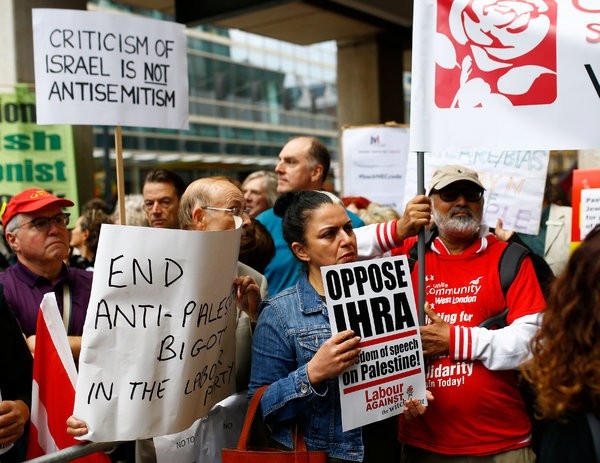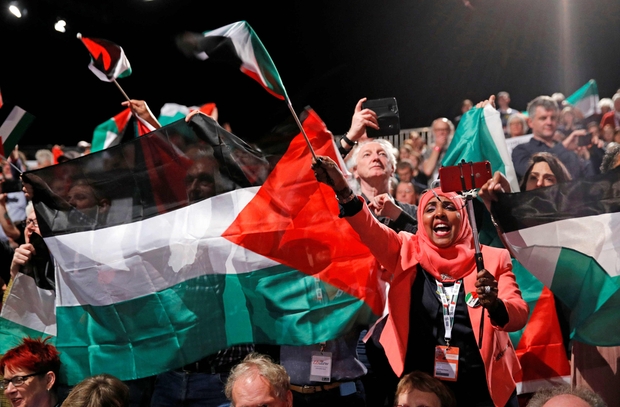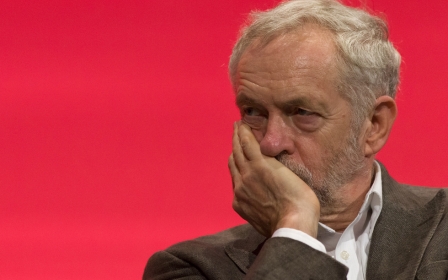Labour bomb threat: When pro-Palestine Jews are targeted, the media is silent

It was supposed to be a film screening at the Labour party conference of a documentary, The Lynching of Jackie Walker, about the controversial black Jewish Labour party member who was suspended due to allegations of anti-Semitism.
The event last Tuesday was hosted by Jewish Voice for Labour, a left-wing group of Jewish Labour supporters formed last year to give backing to party leader Jeremy Corbyn.
Then, 15 minutes into the film, a man called the venue, Blackburne House, and said: “Is there a Jewish event going on?” According to JVL media officer Naomi Wimborne-Idrissi, the receptionist replied that she knew it was a Labour event but she didn’t know if it was Jewish. The man replied: “It’s a big Jewish event, I want to say there are two bombs that will kill many people.” Then he put the phone down.
It is strange that after months of endless media stories about anti-Semitism in the party, mostly focused on comments made by Corbyn before he was leader, that these incidents have gone largely unreported
Following the bomb threat, the venue was evacuated of 200 people, half of whom had come to see the film. Police were called and are currently investigating the incident, which has all the hallmarks of a hate crime. No bombs were found at the venue. But the filming was cancelled, and if that was the goal of the threat, it worked.
On the day of the event, the Sun newspaper published a highly negative article about Jackie Walker's one-woman show and the film being shown at conference. However, only the Guardian reported the bomb threat among UK national media.
The subject of the film, Walker, has been suspended from the party for suggesting Holocaust Day should not be solely about the Nazi genocide of Jews, but include other genocides such as the Atlantic slave trade.
The bomb threat was not the only incident targeting Jewish Voice for Labour. Two days earlier, on Sunday, a group of JVL supporters were attacked as they left a Labour fringe meeting by a group wearing bodycams and high-vis jackets emblazoned with the letters “JHRW”, an acronym for the group Jewish Human Rights Watch, witnesses say. Its website says JHRW was formed in 2015 to combat the boycott, divestment and sanctions campaign against the Israeli occupation.
They hurled verbal abuse, including allegedly calling a JVL member a “fake Jew”, and one of them followed and pushed JVL co-chair Jenny Manson.
Such incidents, mostly of verbal abuse, are not uncommon in a tense atmosphere within Jewish communities brought on by the media-backed anti-Semitism storm since Corbyn's election as leader, Manson told me.
"It is extraordinarily hostile. It has not been easy for me - we have become heroes and enemies in a way I would have never have expected," she said. However she insisted that framing the issue around anti-Semitism is wrong. "I was being gotten at not because I was Jewish but because of what I represented" as a Jewish supporter of Palestinian rights.
I was being gotten at not because I was Jewish but because of what I represented
- Jenny Manson, co-chair Jewish Voice for Labour
It is strange that after months of endless media stories about anti-Semitism in the party, mostly focused on online comments against Jewish MPs, and on meticulously mined comments made by Corbyn before he was leader, that these incidents have gone largely unreported.
JVL put out a statement last week pointing out that it is frequently targeted, and that it “had hired security staff in anticipation of disruption by right-wing, pro-Israel fanatics who routinely attempt to sabotage pro-Palestinian events, especially those organised by dissenting Jews. Police are investigating the source of the anonymous call but it appears that the bomb threat – a criminal act – indicates growing desperation on the part of those attempting to suppress a narrative they do not wish to be heard.”
Media silence
For the right-wing newspapers and establishment broadcasters who have made such a storm about anti-Semitism in the party, it seems very peculiar, and deeply revealing, that when real threats of violence are made against Jewish Labour members who do not conform to the expected anti-Corbyn narrative, they are ignored.
At the beginning of conference on the BBC’s Andrew Marr show, the presenter of the flagship politics show rehashed all the claims against Corbyn, and urged him to apologise to the camera for all his alleged offences to the Jewish community, which he has repeatedly refuted. During this interview cum ambush, Marr waved a photograph of Labour MP Luciana Berger being escorted in Liverpool by police officers, a protection afforded to her because of anti-Semitic threats against her on social media, and abusive calls to her office.
It was later pointed out that Berger was able to walk around the conference itself without a police protector, and that the highly publicised photos had been taken outside of the conference venue. This hardly mattered for such forensic observers of media accuracy and fairness as Andrew Marr and his producers.
Somehow, it seems unlikely that the orchestrated outrage against Corbyn from large parts of the media will be rolled out any time soon in the case of the intimidation of JVL and Labour members who refute the narrative that all Jews are afraid of Corbyn’s Labour.
Alternative to IHRA
Jewish Voice for Labour has created its own guidelines on anti-Semitism, which diverge from the much-discussed IHRA text and examples, and seek to aid disciplinary cases in the party. These were unveiled at the Labour Party conference.
Beyond its clear definition, the JVL guidelines include examples of anti-Semitism that it hopes will be useful, including on the vexed questions of Israel and Zionism, for example: “Jews, Israelis and Zionists are separate categories that are too frequently conflated by both supporters and critics of Israel. This conflation can be anti-Semitic. Holding all Jews responsible for the actions of the Israeli government is anti-Semitic. Many Jews are not Zionist.”
Jews who are not Zionist, such as many JVL supporters, are outside the mainstream narrative on anti-Semitism in Britain, in which Corbyn has become something of a bogeyman. In this sense they are self-proclaimed dissidents who wish to make it very clear that they support Palestinian rights, Jeremy Corbyn's pro-Palestinian stance, and want to see an end to Israel’s occupation.
As Jonathan Cook has pointed out, the UK’s chief Rabbi Jonathan Sacks and others have tried to suggest that support for Israel among diaspora Jews is so predominant that criticism of pro-Israeli Jews – or “Zionists” - can be seen as tantamount to criticism of Jews in general, and is therefore anti-Semitic. In this light, Corbyn’s criticism of a small number of Zionists was called anti-Semitic by commentators.
The existence of JVL and organisations like them, such as the group of Orthodox rabbis who recently came out in support of Corbyn, are highly threatening to the claims that support for Israel among diaspora Jews is universal. As a result, such “dissident” Jews who support the universal human rights of Palestinians, are if anything more of a threat to the right-wing Israeli apartheid project than any other group in British society.
This inconvenient fact, and the violent threats against them, are being systematically ignored by the media. But their voices will not be silenced, and are growing stronger.
- Joe Gill has lived and worked as a journalist in Oman, London, Venezuela and the US, for newspapers including Financial Times, Brand Republic, Morning Star and Middle East Eye. His Masters was in Politics of the World Economy at the London School of Economics. He is chief subeditor at Middle East Eye.
The views expressed in this article belong to the author and do not necessarily reflect the editorial policy of Middle East Eye.
Photo: Labour Party supporters protest against the expulsion of party members accused of anti-Semitism outside the party's National Executive Committee meeting in London (Reuters)
New MEE newsletter: Jerusalem Dispatch
Sign up to get the latest insights and analysis on Israel-Palestine, alongside Turkey Unpacked and other MEE newsletters
Middle East Eye delivers independent and unrivalled coverage and analysis of the Middle East, North Africa and beyond. To learn more about republishing this content and the associated fees, please fill out this form. More about MEE can be found here.






